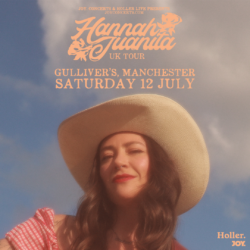
- 13
- 02
- 2016

- 07.30
- pm

- Ballroom
Hey! Manchester presents Gun Outfit
- £7-8
- Buy Tickets
Opening credits. One weekend in 1947, teenaged filmmaker, music video forefather, fledgling occultist, and eventual Mick Jagger collaborator Kenneth Anger shoots a short film of homoerotic surrealism called Fireworks in his parents’ empty house in Beverly Hills. The stated intention is to capture ‘the explosive pyrotechnics of a dream’, and it does so with ghostly brutality, distilling a potent, symbolically charged amalgam of desire, dread, violence and the tentative trappings of magick that would occupy Anger (an Aleister Crowley acolyte) in later years.
Almost seventy years later, Dream All Over, the fourth full-length album by the cinematically minded Los Angeles rock and roll band Gun Outfit – and their first with Paradise of Bachelors – describes a comparable flickering and dimming of dreams, that moment when the lights go up, and the ‘temporary relief’ of sleep’s ‘imaginary displays’ dissolves into stark, deadening lucidity. The songs are suffused with a slyly cynical hangover/hangman’s humour that evokes, from the perspective of ‘a stranger / getting stranger still’, L.A.’s disorienting simulacrum kingdom of crawling pictures: ‘I looked familiar in a foreign land / I couldn’t speak, but I could understand / From another life I rode / Into a desert of my own / And when I put my blanket down / I’m going to dream all over’ (Legends of My Own).
The dangerous California obliquely mapped by Gun Outfit herein bears little resemblance to Tinseltown fantasies, except insofar as the incantatory dialogues of singers Carrie Keith (guitar, vocals, slide) and Dylan Sharp (guitar, vocals, banjo, balalaika) throw off a muted, wary carnal heat, the lingering afterimage of spent desire. (‘Isn’t enchantment what we like?’ asks the song In Orbit, dubiously.) Instead the inscape drawn through Dream All Over navigates the dark side of the moon – the Hollywood Babylon L.A. of Kenneth Anger and David Lynch, Father Yod and Charlie Manson, muscle cars and drought – as reflected upon a pair of road-weary human hearts. As Dylan sings in Only Ever Over, ‘Out here on the West coast where the ocean eats the sun / We’ve known for a long time the end’s already come.’
The band members, all of whom have made or worked on their own and others’ low-budget, homebrew art films in various capacities, draw from the syntax and systems of cinema, in two senses: the songs invoke imagistic memories and unfold like dreams unremembered upon waking, but they also rely on staunchly collaborative team processes. The unmistakable rhythm section of Daniel Swire (drums, percussion) and Adam Payne (bass, also of Residual Echoes) fuel Dylan and Carrie’s spacious, enmeshed guitar work with a corporeal throb, and all decisions are democratically decided. Friend and mentor Henry Barnes (Amps for Christ/Man Is the Bastard) plays three different homemade electric sitars on the record.Facundo Bermudez (Ty Segall, No Age) engineered and co-produced.
Although reared in the realm of hardcore punk aesthetics, these days Gun Outfit bears a greater sonic and songwriterly kinship to the likes of Lee Hazlewood or Blaze Foley than to anything released in the heyday of the SST label. But there is an unspoken understanding throughout their recordings, but pointedly so on Dream All Over, that punk rock is folk music, certainly as much as honky-tonk belongs to the American folk tradition. But the band somehow communicates this kinship by barely acknowledging the formal tropes of either genre. It’s a compellingly elusive aesthetic strategy articulated in the withering Gotta Wanna: ‘I wanna squirm around / I’m a wild primate / Can’t never make no art / When my clothing chafes.’
There are many such moments on Dream All Over, deflating lyrical reversals that frame these plainspoken riddles with devastating regret and resignation, in the manner of all great country songs. The existential beach-blanket bingo ritual of Came to Be (‘futility,’ we learn, is ‘the reason for the partying’) ends with a scathingly dismissive indictment: ‘And that’s what I know of Paradise.’ Worldly Way finishes with a desolate aphorism: ‘Oh world, what knowledge do you teach? / To grow a tail and chase it / Or sit awhile in grief.’ The album begins with a cautious, nodding admission of our powerlessness to resist the dominion ‘Of the often noticed clock / And its fascist frame.’ But it ends with a glimmer of prehistoric hope, a ‘temporary relief’: ‘So cup a little coal / Try to make it glow / We’re going to have a fire before we go.’ End credits.



